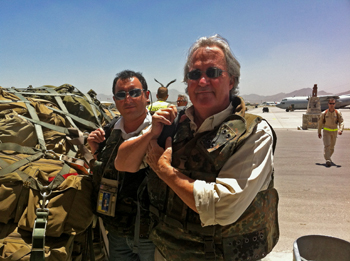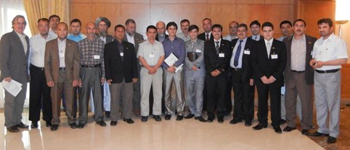|
AFGHAN CARPET PRODUCERS SELL
$1.7 MILLION WORTH OF PRODUCTS
AT DUBAI CARPET CONFERENCE

Alex Zahir, left, and Rob Leahy at Camp
Marmal, Mazar-e Sharif, Afghanistan.
|
WASHINGTON, DC—Afghan carpet producers sold $1,730,970 in total product orders at the Afghanistan/USA Carpet Conference held in Dubai, UAE, Sept. 20-22, 2012, according to the Embassy of Afghanistan, here.
The event was sponsored by the Afghanistan Reconstruction & Investment Task Force, part of the U.S. Department of Commerce’s International Trade Administration.

Afghan carpet producers join Rob Leahy (far left) at
the Dubai conference.
The conference connected 20 Afghan carpet making companies with 20 American and European rug importers and retailers and established a direct line for future business.
Serving as industry experts for the Afghanistan Investment & Reconstruction Task Force are retailer Rob Leahy, owner of Fine Rugs of Charleston, Charleston, SC, and rug importer Alex Zahir, a native Afghan who is now based in Knoxville, TN.
Leahy and Zahir have been surveying and studying the rug business in Afghanistan.for several years. They have traveled to Afghanistan and met with more than 180 companies that span the supply chain—from sheep’s wool production to shipping companies.

Kenneth Mink,left, of The Mink Companies, which operates the Macy's rug departments coast to coast;
Rob Leahy, owner of Fine Rugs of Charleston, and Paul Cocklin of Mink/Macy's.
"It was heartwarming to have so many American and European companies come to Dubai, and then to witness them buy as many rugs as they did. It will give an immediate boost to the carpet businesses of northern Afghanistan and link them to new customers for years to come,†Leahy said.
“The opportunity for the carpet trade in Afghanistan comes at a time when world demand for manufactured goods, including hand knotted rugs, is rising again,†said Leahy “This pushes up costs in other rug weaving countries and forces buyers to look for new sourcing situations. We see Afghanistan beginning to build up production in a market that has improving demand and rising prices. That is a formula for success.â€
At the conference, speakers presented data on market opportunities and led open discussions concerning purchasing rugs direct from Afghanistan, rather than producers sending them to Pakistan for shipment to the U.S. and other customers.
“The outcome of this conference exceeded all of our expectations. The goal was to have the traders and importers meet and perhaps have a few orders placed. It's clear we did our job to promote the Afghan Brand at this conference," noted Emma Robinson, business and industry specialist with the Afghanistan Reconstruction Task Force.
"Afghan producers were quite satisfied with the results of the conference and some noted that it was a unique opportunity to better understand the dynamics of the Afghan carpet trade. Most importantly, they were optimistic about the growth and development of Afghan rugs," according to the Embassy of Afghanistan.
“Afghan rugs showcase the highest quality of hand woven artistry seen anywhere in the world,†said Shakib Noori, Commercial Attaché for the Embassy of Afghanistan in Washington, D.C.
“The carpet industry also provides important income for a wide range of people in Afghanistan, especially for rural areas and for women who often do the beautiful weavings that have made Afghan carpets internationally renowned.â€
The carpet industry in Afghanistan represents one of the economy’s most important sectors, he noted. It employs people at every step of the process from the rural farmers who produce the wool to the exporters who sell and ship the finished product.
After the conference, several attendees traveled to Afghanistan, where they visited carpet producers.
Sheep to Shop Initiative
The Embassy of Afghanistan in Washington, D.C. and Afghanistan’s Ministry of Commerce and Industries have been working closely with the Afghanistan Investment and Reconstruction Task Force of the U.S. Department of Commerce to develop the Sheep to Shop program.
The goal of the Sheep to Shop initiative is to bring American buyers and Afghan producers together as well as to showcase the products created with the help of the program.
The Sheep to Shop initiative helps Afghan carpet traders build a stable and sustainable future, from improving wool to promoting exporting directly to U.S. rug importers from Afghanistan, according to the Embassy of Afghanistan.
The recent Dubai conference was held as a final step in the Sheep to Shop pilot program.
The pilot program consisted of carpet traders from
Mazar-e Sharif and the Balkh province of Afghanistan. This region, while not the most famous for carpet production, proved to be the most willing to adapt their products to market demands.
"The next phases of Sheep to Shop will begin in late 2012 and will focus on the Kabul and Herat provinces, according to Robinson of the Department of Commerce..
"Many people have concerns when it comes to doing business in Afghanistan, with regards to its stability and the risk involved. We were able to help calm those fears and in doing so the Afghan carpet exports to the U.S. saw a 69% increase from overall exports to the US from 2011-2012 in just one day. We can’t wait to start the next phase of Sheep to Shop,†Robinson said.
The Sheep to Shop program, featuring Ariana Rugs, was also presented to High Point Market attendees last month, with an exhibit at Suites at Market Square.
|
Goals of the ‘Sheep to Shop’ Program:
-
Help Afghan carpet traders build a stable and sustainable future by exporting directly to US rug importers;
-
Analyze and improve the sheep’s wool, yarn making and dyeing supply chain to the carpet makers of Afghanistan;
-
Revitalize the carpet traders’ businesses through education, team-building and goal setting;
-
Help Afghan producers know the best type of rug to make and maintain consistency throughout the order, production and shipment process;
-
Educate carpet making companies about the expectations of US rug importers, so they can fulfill their orders and build strong ongoing relationships.
|